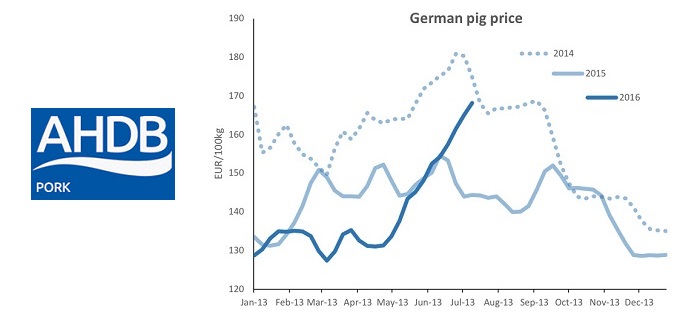The continued improvement of pig prices in Germany is a “welcome respite after a tough time” says AHDB Pork, with the country’s upturn in pigmeat values also helping to ensure that prices in other EU member states, including the UK, are supported.
“German pig prices have been increasing significantly since May, following two years of declining prices,” said AHDB Pork, in an extended analysis of the country’s pigmeat industry.
“The deflationary effect on the German pig price has been well documented, with the impact of the Russian import ban, subdued consumer demand across Europe and increasing production all being contributory factors. However, the price now seems to have turned a corner, with strong Asian export demand and tightening supplies supporting this, and current signs are that it may continue to increase through the second half of the year.”
Having fallen to a low of €1.27 per kg (£1.06/kg) in March 2016, the German pig reference price increased steadily through April before accelerating through May and June. In the latest week, ended July 14, it stood at €1.68/kg (£1.40/kg), which is almost €0.24 (20p) higher than at the same point in 2015.
In addition to noting that strong demand from China is undoubtedly a driving force behind the recent upturn in Germany, AHDB Pork also highlighted a 150% rise in the value of export shipments to China, compared to 2015.
“The surging Chinese pig price, exacerbated by a shortage of domestic supply in the face of increasing demand, has seen the value of German exports to China soar,” it said.
“A tightening of supply has also supported the German pig price. From the latest census, released in May, the German pig herd had fallen a further 4%, to 27 million head. Within this, the breeding herd was back 6%, which will result in a further tightening of supplies in the second half of the year.
“With Germany remaining at the heart of the EU pig market, developments there will continue to influence the rest of the EU, helping to ensure that prices in other member states, including the UK, are supported.”




